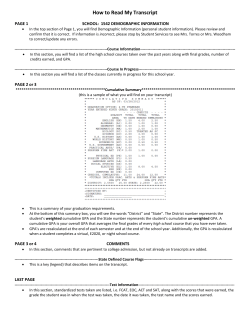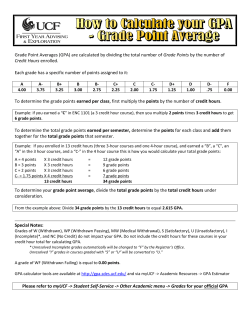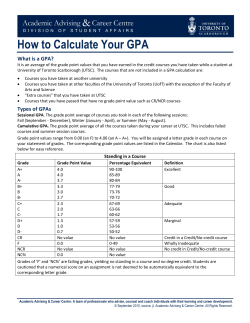
SETON HALL LAW REVIEW SETON HALL LEGISLATIVE JOURNAL SETON HALL CIRCUIT REVIEW
SETON HALL LAW REVIEW SETON HALL LEGISLATIVE JOURNAL SETON HALL CIRCUIT REVIEW Summer 2013 Combined Writing Competition COMPETITION DESCRIPTION • Note of recent decision and Blue Book (19th ed.) Exercise IMPORTANT DATES • Anonymous Numbers Available at Registrar’s Office: Wednesday, April 10, 2013 • Problem Available: Saturday, May 11, 2013, at 10:00 a.m. • Completed Problem Due: Thursday, May 23, 2013, at 7:00 p.m. • All Journal Orientation: Wednesday, August 21, 2013 • Problem will be available through http://law.shu.edu/journalcompetition ELIGIBILITY • Please see attached guidelines for each individual journal regarding division and GPA requirements as requirements differ for each journal. Each student is responsible for assuring that they meet the requirements for any and every journal to which they are applying. • All interested students must obtain an anonymous number from the Registrar’s office: o First-Year, Full-Time students must sign up for an anonymous number in the “1000” series o First-Year, Part-Time*† students must sign up for an anonymous number in the “2000” series o Second-Year, Part-Time* students must sign up for an anonymous number in the “3000” series o Second-Year, Full-Time and Third-Year, Part-Time* students must sign up for an anonymous number in the “4000” series • • Please note that “Part-Time Students” include Part-Time Day and Evening Students. † The only First-Year Part-Time students that can participate in the journal competition are those that are transferring to Full-Time Day for the Fall 2013 semester SETON HALL LAW REVIEW Membership Information The Seton Hall Law Review is the law school’s oldest academic journal. The Law Review’s commitment to the advancement of the law through an informed and vigorous academic discourse has spanned four decades. Federal and state judges, prominent academics and practitioners, and more than one thousand young legal minds have contributed to the Law Review since its inception in 1967. In that time, Seton Hall Law Review has been cited numerous times by the Supreme Court of the United States, as well as in hundreds of federal and state court cases. Building on the diligence and insight of its members and faculty advisors, the Law Review continues to grow in national prominence. The Law Review is an independent, student-edited journal that publishes four issues in each volume, typically amounting to well over one thousand pages per year. The Law Review is committed to maintaining a timely publication schedule, creating positive working relationships with authors, and publishing timely, relevant, and noteworthy manuscripts. Law Review membership is first and foremost a commitment to advancing the theory and practice of the law. Members benefit and develop as young lawyers by honing their writing, editing, and analytical thinking skills, as well as through their interactions with their peers and authors throughout the editorial process. The skills and networking opportunities members establish serve them well regardless of the practice area or profession they ultimately enter. Law Review membership is a great privilege that connects students with past, present, and future members for years to come. It is, however, an endeavor demanding of time, energy, and mental acuity. New Members will be required to write one Comment of publishable quality, on a topic of their choice, with the guidance of a faculty advisor. Generally, the twenty best comments are selected for publication in the following volume. The opportunity to publish one’s research in the form of a student Comment is unparalleled in the law school experience. Additionally, all members assist in the publication process by editing, Bluebooking, and attribution checking both the work of professors and other students. Please read through the Law Review Constitution (available at http://erepository.law.shu.edu/shlr/constitution.pdf), and Membership Requirements to answer any questions you may have. Of course, also feel free to e-mail the Editor-in-Chief, Matt Engel, matthew.engel@student.shu.edu. Because this is a student-edited journal, faculty members might not know the answers to your questions and the Law Review is not bound by what a faculty member might say about our admissions process or policy, so please direct your questions to the Editor-in-Chief and other Law Review members. SETON HALL LAW REVIEW Membership Information The Write-On Competition - Selection Criteria & Process The write-on competition is highly competitive—offers are extended to only thirty to thirty-five students. The application process is anonymous, and offers are extended based on a combination of the student’s quality of writing, grades, and citation formatting. From this pool of applicants emerges a diverse membership, comprised of individuals with a variety of professional, educational, and social backgrounds who stand ready to make meaningful and unique contributions to the Law Review. Students must meet the minimum GPA requirement for their respective class to be eligible: • • • • • First-year full-time day students: 3.0 First-year part-time students (who will transfer to full-time day division by the Fall 2013 semester): 3.0 Second-year part-time students: 3.0 Second-year full-time students: 3.5 Third-year part-time students: 3.5 Offers of membership will automatically be extended to the five students, regardless of class, with the highest GPAs who participate in1 the write-on competition. Offers of membership will also be extended to the students with ten highest scores on the Note and Bluebooking exercise (so long as they meet the minimum GPA requirement). The remaining members are selected as follows: students must have a Note/Bluebooking exercise in the top 50%. From this list, the remaining members are chosen based upon a combination of GPA and write-on scores. The Law Review is a student-run journal; the Editorial Board makes all membership decisions. Neither faculty nor administrators can promise a student a position on the Law Review. Any information they may give to students about the selection criteria and process is not binding on the Law Review. If you have any questions ask the Editor-in-Chief, or (during the write-on competition) pose your question on the discussion board. 1 To “participate in” means, at a minimum, a good faith effort to complete the write-on competition assignment. For example, if a student submits ten pages of blank paper as her entry, she will not be considered to have “participated in” the competition (this would be relevant for a student who is relying on her GPA to trigger our “automatic offer” provision). In all other circumstances, the Law Review Editorial Board will determine whether a student has “participated in” the competition. As noted above, the Editorial Board alone is responsible for articulating, explaining, and enforcing this policy. SETON HALL LAW REVIEW Membership Information Write-On Competition Frequently Asked Questions Question #1: Last year I was a first-year, part-time day student, but I transferred to the full-time program this year, making me a second-year, full-time student. Does the 3.5 minimum GPA requirement apply to me? Answer Yes, the 3.5 minimum GPA requirement applies to all students who are currently second-year, full-time students and third-year, part-time students. Question #2: My GPA will probably be above a 3.0, so I will be eligible to receive an offer from the Law Review, but given that it is not going to be much better than a 3.0, is it worth it for me to compete? Answer Yes!!! The Law Review expects to take approximately 30 new members. Ten of those members will be chosen based solely on the quality of the survey they submit. Then we will extend offers to the individuals who have the top five GPAs out of those people who submitted surveys. The remaining new members will be chosen based on a combination of the quality of their surveys and their grades. Question #3 How does Law Review score the Note and Bluebook exercise? Answer Each Note is read by 3 current members. The Note is scored on substance, form, and style. The Bluebook exercise will count for no more than 20% of the total score (this does not include the Bluebooking grade for the Note portion of the survey) and will require students to use the Bluebook to form correct citations that would be used in a typical journal piece. SETON HALL LAW REVIEW Membership Information Question #4 How can I have a fair chance of doing well on the competition if the subject matter of the assignment focuses on a course that I haven’t yet taken? Answer When we review submissions, we are not looking for the substantive accuracy regarding the underlying law; you will not earn extra points by being able to cite to other cases from memory that you might remember from class; you will not lose points for failing to pick up nuances of a doctrinal area that aren’t evident from the case. We are looking primarily at your analytical skills, how you organize an argument, and the style of your writing. These will not be affected by the subject matter of the case material. Question #5 If I have a top-5 GPA in the evening (or day) section, do I have an automatic bid onto the journal? Answer No, you do not have an automatic bid. We take the five students with the five highest GPAs overall . . . thus, all five could come from the day section, all five could come from the evening section, or it could be a combination of day and evening students. Even if you do have a top-5 GPA, you must still complete the write-on competition (i.e., you cannot submit 15 pages of blank paper and expect an automatic offer). If you have any questions regarding Law Review standards, ask the Editor-in-Chief for clarification. Neither faculty members nor administrators will be in the position to speak to journal’s membership requirements; any information you receive from a faculty member or administrator is not binding on the Law Review.! ! ! SETON HALL UNIVERSITY SCHOOL OF LAW LEGISLATIVE JOURNAL “Devoted to encouraging interaction between the legal profession and the legislative process.” The SETON HALL LEGISLATIVE JOURNAL is a nationally-recognized periodical focusing on legislative, statutory, and regulatory topics. The Legislative Journal is an independent, and student-edited journal that publishes two editions per year. Authors include state and federal legislators, judges, members of the academic and practicing communities, and law students. The Journal subscribers include state and federal legislators, members of the federal and state judiciary, law schools, bar associations, public libraries, and members of the academic and legal communities. Members of the Journal will write an original student Note on a topic of their choice involving state or federal legislation. Each student’s Note is considered for publication in the following year’s issues. The prospect to publish in a journal disseminated to federal and state court judges, as well as state legislators is an exceptional opportunity for all law students. The Note criteria for the Journal allows for a breadth of topic choices, including articles on passed and proposed legislation, as well as suggestions for future legislation. Topics of Articles and Notes published in recent editions of the Legislative Journal range from critiques of federal laws such as No Child Left Behind, the Dodd-Frank Act, and the Bankruptcy Code to insights into the balance of power among the branches of New Jersey state government. In addition to writing a student Note, members will gain valuable legal writing skills and expertise in legislative scholarship through editing the Articles and Notes being published by the Journal. Students will also have the opportunity to work with mentors assigned by the Journal, who will further hone and critique each member’s legal writing and editing abilities. Each member that fulfills the obligations required by the Journal will receive one credit per semester. SELECTION CRITERIA Membership in the SETON HALL LEGISLATIVE JOURNAL is limited to second and third year law students who are selected on the basis of their performance in an annual writing competition coupled with their GPA. Seton Hall Law School students who are interested in joining the Legislative Journal must participate in the write-on competition. All members are selected based on a combination of their grades and their write-on competition scores. The current members and editors grade each submission focusing on the author’s argument structure and substance, overall style, proper Bluebook citations, attention to detail, and grammar. ! ! In recent years, the number of students who complete the competition has ranged from 100 to 175. Of these, between 20 and 30 students will be invited to join the Legislative Journal. Students involved in the competition will be notified of the results in early July. Those students who are selected to join the Legislative Journal must return to the law school in mid-August for orientation. QUESTIONS If you have any questions about the Legislative Journal please feel free to email next year’s Editor-in-Chief, Courteney Lario, at Courteney.lario@student.shu.edu. SETON HALL CIRCUIT REVIEW The Circuit Review’s Mission The Seton Hall Circuit Review is an independent, student-edited journal committed to advancing legal dialogue through the publishing of scholarly works focusing on important issues pertinent to the United States Circuit Courts of Appeals. Founded in 2004, the Circuit Review is the youngest academic journal at Seton Hall University School of Law. The journal publishes two issues per volume and hosts a symposium each academic year. The Circuit Review’s mission has been welcomed by the academic community and judiciary alike. As Justice Alito remarked in the inaugural issue, “It will come as no surprise that a court of appeals judge welcomes the arrival of a new journal devoted to the study of the courts of appeals, but there are sound reasons to applaud this new publication.”1 Impact on the Legal Community For practitioners, the courts of appeals provide binding law and, until the Supreme Court speaks, a practitioner’s respective court of appeals is the supreme arbiter of the law for that circuit. Since only a handful of the thousands of cases appealed to the federal courts of appeals are ever reviewed by the Supreme Court, tremendous power lies in the hands of circuit judges. Circuit Review members contribute to staffauthored sections that report all new circuit splits and issues of first impression confronted by the circuit courts. These sections are found particularly useful by practitioners and distinguish the Circuit Review as a practical and useful publication for both attorneys and judges. The Seton Hall Circuit Review stands as a valuable resource to federal judges, practitioners and academics alike. The journal publishes scholarly articles focusing on issues at the federal appellate level. Because the target readership of the Circuit Review consists of many of the most powerful and prolific contributors to American jurisprudence, membership provides a tremendous opportunity to help shape the legal dialogue in virtually any area of law. Each member has the opportunity to contribute to this dialogue by authoring a student comment that will be considered for publication in the Circuit Review. Furthermore, the entire membership shares the responsibility of editing articles submitted for publication for style, content and correct citation format. The Circuit Review’s impact on the legal community became palpable last year, when one of our student comments2 was cited in a brief to the United States Supreme Court. Selection Criteria We encourage all full-time and part-time students not already on academic probation or in danger thereof to send a write-on submission to the Circuit Review. The journal considers the GPA and the write-on score of each applicant. Current editors and members evaluate and score each submission based on substantive merit, persuasiveness of the argument, the author’s style and grammar and adherence to 1 2 Justice Samuel A. Alito, Jr., Foreward, 1 SETON HALL CIR. REV. 1, 1 (2005). Justin Conforti, Comment, Somebody's Watching Me: Workplace Privacy Interests, Technology Surveillance, and the Ninth Circuit's Misapplication of the Ortega test in Quon v. Arch Wireless, 5 SETON HALL CIR. REV. 461 (2009). competition rules and to proper Bluebook citation form. No heightened selection criteria apply to secondyear students. Academic Credit The Seton Hall Circuit Review is a fully accredited academic journal and offers one credit per semester to all members who fulfill their membership requirements. Advanced Writing Requirement Circuit Review members may satisfy their advanced writing requirements with their student comment. AWR certification is performed by one’s faculty advisor and is completely independent of the Circuit Review. Students who are in a concentration may have additional requirements to satisfy their AWR requirement and should consult the appropriate program guidelines. Questions about the Circuit Review If you have any questions, please ask any current member, or reach out to our Editor-in-Chief, Patrick Coughlin, directly at patrick.coughlin@student.shu.edu The editorial board of the Seton Hall Circuit Review wishes all potential applicants the best of luck on your upcoming finals and the write-on competition.
© Copyright 2025













